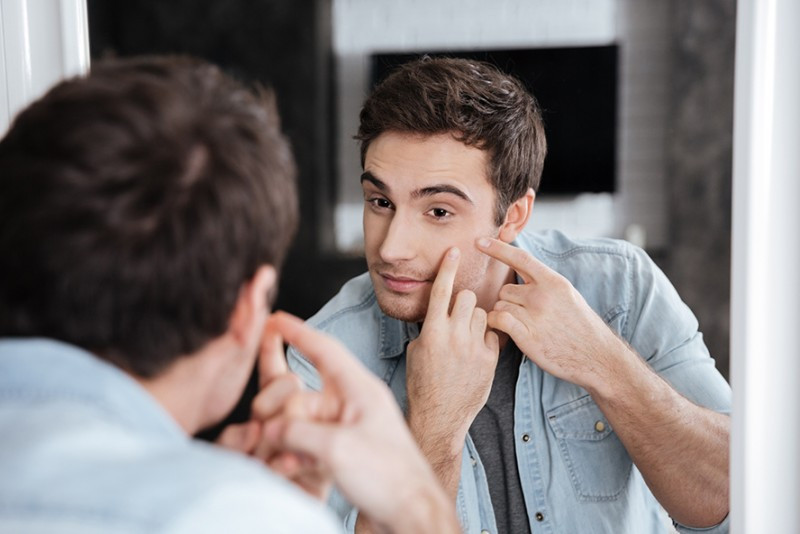Acne, otherwise known as pimples, is one of the most common dermatological conditions, affecting millions of young adults worldwide – and a relative handful of older adults as well. Assumptions about a possible link between what we eat and the appearance of acne on young people's faces, as well as other body locales such as the upper back, have long been bandied about, based on nothing much more than anecdotal hearsay. It is only in recent years that actual scientific research has started to pin down connections between our diets and the occurrence of acne. Debate remains, though. In 2007, per the National Institutes of Health, the American Academy of Dermatology stated there was insufficient evidence to link the consumption of certain foods to acne, although more recent studies have hinted at a close relationship between diet and acne. A 2010 article published in the scientific journal Skin Therapy Letter, cited at annmariegianni.com, reported that an analysis of 27 separate studies found that the ingestion of cow's milk produced a higher prevalence and severity of acne as well as ties between a high glycemic load diet and an increased risk of acne. Eat or drink enough of the wrong stuff, and your skin breaks out.
American Diet Causes Acne Outbreaks
Several years earlier, Australian researchers found that males between the ages of 15 and 25 – with mild to moderate acne – saw a significant improvement in their complexions when they switched from a typical American diet of white bread and processed breakfast cereals to a healthier regimen that included whole grains, lean meat, and fruits and vegetables. The acne of the boys on the higher-protein, low-glycemic index diet improved . . . by more than 50 percent, which is more than what you see with topical acne solutions, said Australian professor Neil Mann, senior author of the study, quoted at annmariegianni.com.Does Chocolate Cause Acne?
For years, much of the anecdotal scuttlebutt concerning the diet-acne dynamic has taken aim at chocolate, as in chocolate bars, chocolate cakes and the ever-popular chocolate pies and milkshakes. But don't throw out those Hershey bars just yet. Many experts, to the delight of chocolate lovers, have debunked the chocolate-acne connection as some sort of urban myth. Or is it? Consider a small Netherlands study published in 2013. Those researchers found, among other things, that eating chocolate increased the production of a substance known as interleukin 10, which is believed to reduce our body's defenses against microorganisms, thus allowing bacteria to infect pimples and worsen them. Then again, the study used only seven healthy people as test subjects, using blood samples to gather their evidence after feeding them a daily dose of 1.7 ounces of chocolate.Blood Sugar Also a Factor
Another factor that links diet to acne is blood sugar levels within our bodies. Per healthline.com, foods that raise our blood sugar can cause our body to release insulin. The resulting excess insulin in our bodies causes our oil glands to produce more oil – the sort of oil that contributes to an increase in acne. Such foods include pasta, white rice, white bread, and sugar, putting those foods into the category of high-glycemic carbohydrates.What to Eat and What to Avoid to Help Clear Up Acne
Following is a list of foods to eat as well as those to avoid if your goal or at least your hope is to steer clear of pimples, aka acne:- Good: Fatty fish, such as salmon, with their omega-3 fatty acids. These can help alleviate inflammation and guard against acne breakouts.
- Avoid: Milk that comes from dairy cows. It spikes blood sugar and insulin levels, which can lead to inflammation and skin oil production, respectively.
- Good: Fruits and veggies that contain beta-carotenes, which are good for minimizing skin oils that contribute to the growth of acne.
- Avoid: Whey protein, per a small study cited by self.com. Improvement in complexion has been seen when patients eliminate powders and bars containing whey protein.
- Good: Oysters contain a fair amount of zinc, which studies have shown to be effective in minimizing the effects of acne. Other foods with ample zinc include toasted wheat germ, roast beef, cashews, turkey, lentils, crab, and roasted pumpkin seeds.
- Avoid: High-glycemic foods, which cause hormone levels to go up. These include high-sugar beverages and fruit juices, candy, French fries, and white rice, per everydayhealth.com. Look for whole, high-fiber foods instead.
- Good: Probiotics, can also help reduce inflammation as well as tamp down oxidative stress, which may be contributing factors to the rise of acne.
- Avoid: Coconut oil. Or at least limit the use of it, as it is healthful in other ways and tastes great. Consider swapping it for sunflower-seed oil if you see breakouts (of acne) around your mouth, says self.com.

